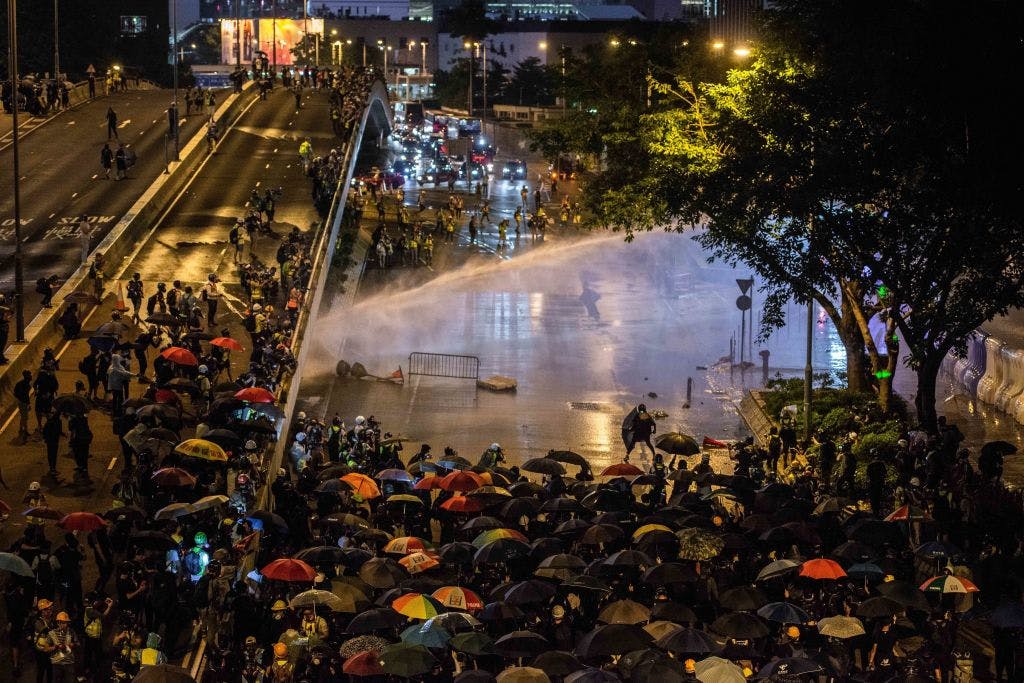Since June, protesters in Hong Kong have taken to the streets over concerns about China's growing influence there. And tensions still haven't cooled down. Here's everything you need to know about Hong Kong's relationship with China.

The Story
A proposed extradition law in Hong Kong has led to some of the largest protests in the territory’s history. And is raising fears about China’s growing influence there.
The Background
Modern China has been ruled by a single party – the Chinese Communist Party – for decades. Disagreeing with or speaking out against the CCP is considered a major party foul. And the country is known for exercising a lot of control over citizens. Including using violence to crack down on protesters, plus using surveillance to monitor text messages, and even whether people are jaywalking. And killing any chance to go down a Google rabbit hole...by censoring websites and web searches. Skimm Notes goes deep on China’s history as a surveillance state:
What a buzzkill.
Seriously. On top of all this, China has been practicing its power stance in the mirror. As in modernizing its economy by investing in technology, pouring money into its military, and rolling out initiatives like a massive infrastructure project to connect Asia, Africa and Europe (we Skimm’d more on that below). It’s the most populous country in the world and the second-largest economy. And President Xi Jinping has grand plans for total domination.
Like what?
Well for starters, last year China’s legislature voted to get rid of presidential term limits in the country’s constitution. Meaning the road’s clear for Xi to rule for, umm, ever. Or at least indefinitely. His goal is to establish China as a global power to be reckoned with. Through trade, diplomatic ties, fighting gov corruption at home, and keeping a very close eye on China’s neighbors. Learn more about what he’s like as a leader here:
What do you mean by the neighbors part?
China’s relationship status with Hong Kong and Taiwan – two places that aren’t fully under China’s communist grasp – is very much in ‘it’s complicated’ territory.
Hong Kong…a former British colony that was handed back to China in 1997. The deal was that Hong Kong got to continue mostly doing its own thing for 50 years. Think: its own laws, justice system, and economy. While China handles defense and foreign affairs. The jig is up in 2047. But under Xi’s leadership, China has shown signs of getting handsy ahead of schedule. Think: increased authority over Hong Kong’s elections. And an extradition bill that’s been making headlines recently. We’ll get into that in a bit.
Taiwan…a democratic island off the southeastern coast of China. In the ‘90s, the two agreed that there is only ‘one China’ and Taiwan is a part of it. But both sides are allowed to have different interpretations of what this means in practice. If you’re thinking ‘huh?’ you’re not alone. Taiwan’s feelings towards China have gone hot and cold over the years. Today, the two have close economic ties. But Taiwan’s ruling party wants China to back off. Meanwhile China very much wants to make Taiwan an official part of the fam and takes steps (like trying to prevent Taiwan from joining international orgs) to make sure the island doesn’t move towards independence.
We Skimm'd more on China's global influence here.
The Big Issue
Since June, millions of people in Hong Kong have taken to the streets to protest an extradition bill that would have sent some criminal suspects to mainland China and certain other jurisdictions (like Taiwan). Hong Kong’s government said the bill is necessary to prosecute a Hong Kong man wanted on murder charges in Taiwan. But critics have worried it would allow the gov to detain pretty much anyone it wants.
Protests first broke out on June 9.
What’s the latest?
In September, Hong Kong leader Carrie Lam withdrew the bill. But she didn't resign – something critics have called for. And protests have continued for months after the decision to withdraw the bill.
The Debate

The Impact
On Hong Kong…even though the bill has been withdrawn, there are still concerns over China encroaching on Hong Kong’s civic liberties decades before their “one country, two systems” agreement expires. Plus, Hong Kong is an international business hub. And this sort of tension could put the territory’s economic relationships on edge. We get into that in Skimm This:
On the US…aka China’s biggest competition on the global stage. They’re the two largest economies in the world, and both are fighting to be the diplomatic and economic kings of the 21st century. Any sign that China and Hong Kong are getting cozier and squashing democratic values could impact US-Hong Kong economic relations. And one group that makes recommendations to Congress says an extradition law would create security risks for US citizens living or traveling in Hong Kong.
Asia…it’s the world’s most populous region. And as Beijing has upped its influence in the area, developing countries have started taking cues from China’s authoritarianism. Meanwhile, unrest in Hong Kong could impact China’s ability to exercise more control over other nearby autonomous and semi-autonomous regions – like Macau, Tibet, and Taiwan.
theSkimm
China views any shift toward or desire for democracy as a threat to its one-party system. Political crises like the latest one in Hong Kong make people on all sides nervous. China about Hong Kong’s outspoken dissent. Hong Kong about China’s growing foothold. And the West about what a global power shift could mean for the world.
Live Smarter
Sign up for the Daily Skimm email newsletter. Delivered to your inbox every morning and prepares you for your day in minutes.





